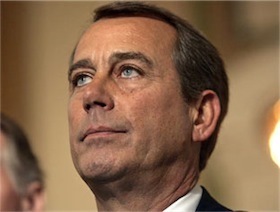Matthew Yglesias's Blog, page 2409
February 24, 2011
Endgam
Songs about sex:
— Abortion bans are "the mother of all government regulation".
— Slouching toward slave labor.
— Everyone hoping to make money selling economic analysis thinks stimulus works and austerity sucks.
— Ken Salazar makes the case for wilderness.
— Most people don't follow politics closely and actually have no idea what's happening in DC.
— Most cheeseheads support collective bargaining.
Raveonettes, "Love in a Trashcan".
Raveonettes, "Love in a Trashcan"..


The Trouble With Ed Reform Skepticism

(cc photo by kevindooley)
Kevin Drum is an education reform skeptic:
More importantly, though, I've simply become less convinced about the value of all the ed reforms that periodically capture the hearts of the Beltway chattering classes. I'm generally in favor of things like charter schools and disciplinary reforms that make it slightly easier to fire bad teachers, but even if they're worthwhile on their own merits there's not an awful lot of evidence that these things actually improve the overall quality of the educational system. It's not that there's no evidence to support these kinds of reforms, just that the evidence is thin and contradictory every time I look at it. Test scores haven't dropped over the past 30 years. Other countries largely haven't leapfrogged us during the same period. High-stakes testing doesn't appear to have a big impact. Charter schools aren't unquestionably superior to equivalent public schools. Merit pay might work but it might not. The presence or absence of teachers unions doesn't seem to have much effect on educational outcomes. For more on this, try reading Joanne Barken's contrarian take on the ed reform community in the winter issue of Dissent.
I think this is overstated, but the deeper issue for teacher's unions is that pushing this kind of line is ultimately self-defeating. Say it's true that we don't know how to make schools better. That could be for two reasons. One is that it's an epistemological problem—we have no idea what makes a school effective. Another is that it's impossible—learning outcomes are all about parenting and schools are irrelevant. Either conclusion makes the sense for less investment in education and more decentralization of the system. If we had really convincing research that teachers who wear green hats produce better learning outcomes, then unions would swiftly reach an agreement to incentive the wearing of green hats and there'd be no problem. But that's not the case.
So Scott Walker and his odious partisan gambit aside, you're still left with a strong case for reform. I think the evidence is pretty clear that school quality does matter and that there are measurable differences in teacher performance. That's why I think it makes sense to invest in good schools through charter school "smart caps" (see Erin Dillon) and invest in good teachers by paying generous salaries and getting rid of the teachers who don't perform (see Robin Chait). But the kind of "it's all about poverty" edu-nihilism that's often the most convincing argument for skepticism about the merits of reform simply makes the case for across the board disinvestment in educating children. If that's what you think, that's what you think, but obviously it's not a position that teacher's unions are going to like either.


Town, Gown, and Real Estate

Lydia DePillis summarizes ANC2E's demands on Georgetown University:
— New enrollment caps should be set lower than the current student population, in order to remedy past injustices.
— Limits must be imposed on the number of students living off-campus, with further enrollment decreases if those limits are not met.
— Magis Row on 36th Street should revert from undergraduate housing to accommodations for older faculty.
— The University should not be permitted to acquire more property in zip code 20007 without approval from the Board of Zoning Adjustment.
— University and Hospital buses should not be allowed to go through the neighborhoods, but rather enter and exit the campus via Canal Road only.
— Students who commute to Georgetown by car should not be allowed to park in the surrounding neighborhood.
— Georgetown should create a shuttle system to ferry students from M Street bars back to campus on weekend nights.
— Georgetown must develop strong measures to address off-campus student conduct, treating parties outside the university gates, for example, as strictly as those inside it.
Obviously, when neighborhood governing bodies put forward these kind of proposals they're making local real estate policy. They're not trying to make nationwide education policy. But these kind of town/gown conflicts are by no means rare. And when each and every college-adjacent neighborhood in America adopts an expansion-hostile policy regime, the aggregate impact must be pretty large. It's conventional to focus on "[a]ccreditation constraints and social signaling constraints" as the main barriers to more normal higher ed competition, but I wonder about real estate factors. Most of America's old-timey colleges did, in fact, have periods of aggressive expansion that these days are furiously resisted by neighbors. If the downside to making it easier for Georgetown University to expand is that rich Georgetown residents might lose some home equity is that really something we should cry over?
I think "broader college opportunities and more competition in the higher education sector" should be a higher social priority than "protect rich people's fear of change."


Will a Federal Government Shutdown Shut Down the District of Columbia, Too?
Here's a disturbing release from Rep Eleanor Holmes Norton indicating that a federal government shut down may force DC's municipal government to shut down as well:
As the likelihood of a federal government shutdown increased after the House of Representatives last week passed a full-year continuing resolution, we have been making every effort to ensure that the District of Columbia government would continue to be able to spend its local funds if the federal government shuts down on March 4. Because the District does not yet have budget autonomy, Congress technically appropriates to the District its own local taxpayer-raised funds, and the District is only allowed to spend such funds until the current continuing resolution expires on March 4. We have been in contact with the Obama administration, House and Senate leadership, and Mayor Gray to ensure that a federal government shutdown does not force a local government to close, even temporarily.
Surely in true Tea Party spirit House conservatives will see that this is a particularly acute case of DC's unjust taxation without representation status. Right?


Death and Traffic

Highway 401 in Canada
The United States is a very rich place by global or historical standards, which means we need to pay more attention to directly addressing quality of life problems that can't simply be solved with more money in your pocket. The myriad issues surrounding traffic jams ought to be high on the list, and here's the latest news:
Air pollution triggers more heart attacks than using cocaine and poses as high a risk of sparking a heart attack as alcohol, coffee and physical exertion, scientists said on Thursday. Sex, anger, marijuana use and chest or respiratory infections and can also trigger heart attacks to different extents, the researchers said, but air pollution, particularly in heavy traffic, is the major culprit. The findings, published in The Lancet journal, suggest population-wide factors like polluted air should be taken more seriously when looking at heart risks, and should be put into context beside higher but relatively rarer risks like drug use. Tim Nawrot of Hasselt University in Belgium, who led the study, said he hoped his findings would also encourage doctors to think more often about population level risks.
When I say that America's health care spending doesn't deliver much in terms of improved health, I more had this sort of thing in mind than the question of trimming fat in the actual health care system. It's of course true that there's trimmable fat in our delivery of health care, but there are also lots of better ways to make people healthier. Expending resources on preventing heart attacks by creating cleaner air is a wildly more cost-effective way of improving quality of life than is treating heart attacks. After all, treatment costs aside any sensible person given the choice would avoid the heart attack rather than go see an excellent doctor once it happens.


The Immiseration of Capital
Something that I think we don't hear enough about in the inequality debate is that it's not just median wages that have been stagnating recently, it's equity prices as well:

The basic trend of sluggish growth in the early 1990s, fast growth in the late nineties, and stagnation since then is the same as what we see in the wage data. Things were different in the 1980s where we had stocks do well amidst middling GDP growth and terrible wage performance. It's a pretty classic "capital crushes labor" kind of story that goes along nicely with Ronald Reagan's political agenda of helping capital to crush labor as an inflation cure. But for the past 20 years, median wages, stock prices, and per capita GDP have shown a similar basic pattern. The income gains have flowed to people in the third world and a tiny class of American financiers. The smart investment to make in 1990 was to buy land in New York or San Francisco (or, I suppose, Shenzhen).


Democracy à la Livni

There's unquestionably more to democracy than the holding of sporadic elections, but Israeli opposition leader Tzipi Livni's effort to offer a more robust conception seems to me to badly misfire:
Current events in the Middle East highlight the urgency of adopting at the global level what true democracies apply at the national level – a universal code for participation in democratic elections. This would include requiring every party running for office to embrace, in word and deed, a set of core democratic principles: the renunciation of violence and the acceptance of state monopoly over the use of force, the pursuit of aims by peaceful means, commitment to the rule of law and to equality before the law, and adherence to international agreements to which their country is bound.
By this standard, Israel doesn't come close to qualifying as a democracy. The Netanyahu government doesn't respect previous agreements on settlements, no Israeli government has ever renounced violence as a tool of policy, and Jews and non-Jews aren't really equal before the law. What's more, to actually bad participation of political parties that didn't accept these principles would, itself, be a serious contravention of democratic principles. Questions about which kind of rules for linguistic and religious minorities are compatible with equality before the law (Christmas is a federal holiday in the US, but Yom Kippur isn't) don't admit of unambiguous answers.


Legalizing Murder on the Great Plains

Nick Baumann and Daniel Schulman report on the latest efforts from the life begins at conception and ends at birth faction of American politics:
Just when abortion rights supporters thought they had beaten a controversial bill they believe would legalize the killing of abortion providers, it has cropped up again—this time in a more expansive form that has drawn the concern of law enforcement officials.
Last week, South Dakota's legislature shelved a bill, introduced by Republican state Rep. Phil Jensen, which would have allowed the use of the "justifiable homicide" defense for killings intended to prevent harm to a fetus. Now a nearly identical bill is being considered in neighboring Nebraska, where on Wednesday the state legislature held a hearing on the measure.
I note that there's actually no need whatsoever for such a bill to pass. You just need several state legislators to introduce the bill, hold hearings, popularize the idea, generate press coverage and discussion, etc. Soon enough we'll have another assassination of an obstetrician and the perpetrator will use the justifiable homicide defense. Say 20 percent of Nebraskans decide that, yeah, abortion is murder to killing abortion providers is justifiable homicide. How're you going to get a unanimous verdict from a jury?


If We Create Jobs In DC, Where Will They Go?
Dave Alpert criticizes the Gray transition team for having an economic development strategy oriented around making it easier for car commuters to get in and out of the city and into Washington, DC. I agree with everything Alpert says, but I have a more fundamental issue with this analysis—there's noplace left in DC to build offices so what's the point?

Downtown DC is full. There's basically no land left to build on, and you're not allowed to build higher. If you make it a more attractive place to locate jobs, no additional jobs will be created because there's noplace to put the jobs. The improved quality will show up as higher rent for landlords, and our rents are already the highest in the nation. If you relaxed the height limit, the high rents would spur new construction (=jobs) which would lead to lower rent per square foot which would make downtown, DC a more attractive employment destination. Then it would be a good time to talk about how to handle the commuters. But right now the city's like a restaurant that nobody can ever get a table at wondering if cutting prices will gin up more business.


Boehner's Offer to The White House Is This: Nothing

As an illustration of what I was saying below, check out the details on the House GOP's proposed compromise to avoid a shutdown with a stopgap spending measure:
House Republicans told Senate Democrats on Wednesday that they would agree to a temporary spending bill to avert a government shutdown next week only if the measure began instituting House-passed cuts on a pro-rated basis. [...] Democratic aides said the short-term proposal was likely to be deemed unacceptable since it simply reflected a staggered version of the $61 billion in cuts approved by the House on Saturday in a proposal Senate Democrats already oppose.
They're literally offering nothing.
You see the same spirit in the various riders that have been attached to the House version of the continuing resolution. The sheer quantity and diversity of them is the tell. For the President to sign such a bill would be, in essence, to cede all legislative authority to the House majority rather than maintaining America's "status quo stays unless everyone agrees" system. That's not a concession any White House is going to make, and John Boehner knows it, so a shutdown is inevitable.


Matthew Yglesias's Blog
- Matthew Yglesias's profile
- 72 followers



